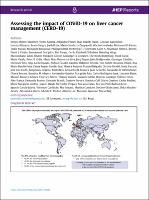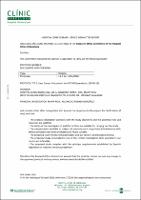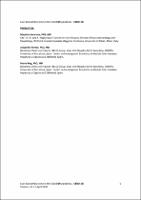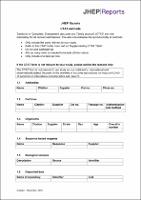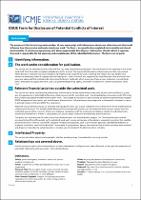| dc.contributor | Vall d'Hebron Barcelona Hospital Campus |
| dc.contributor.author | Muñoz-Martínez, Sergio |
| dc.contributor.author | Forner, Alejandro |
| dc.contributor.author | Nault, Jean-Charles |
| dc.contributor.author | Sapisochin, Gonzalo |
| dc.contributor.author | Rimassa, Lorenza |
| dc.contributor.author | Minguez Rosique, Beatriz |
| dc.contributor.author | Sapena, Victor |
| dc.date.accessioned | 2021-12-27T13:11:19Z |
| dc.date.available | 2021-12-27T13:11:19Z |
| dc.date.issued | 2021-06 |
| dc.identifier.citation | Muñoz-Martínez S, Sapena V, Forner A, Nault JC, Sapisochin G, Rimassa L, et al. Assessing the impact of COVID-19 on liver cancer management (CERO-19). JHEP Reports. 2021 Jun;3:100260. |
| dc.identifier.issn | 2589-5559 |
| dc.identifier.uri | https://hdl.handle.net/11351/6731 |
| dc.description | Coronavirus SARS-CoV-2; COVID-19; 2019-nCoV; Clinical trials; Liver cancer |
| dc.description.abstract | Background & aims: The coronavirus disease 2019 (COVID-19) pandemic has posed unprecedented challenges to healthcare systems and it may have heavily impacted patients with liver cancer (LC). Herein, we evaluated whether the schedule of LC screening or procedures has been interrupted or delayed because of the COVID-19 pandemic.
Methods: An international survey evaluated the impact of the COVID-19 pandemic on clinical practice and clinical trials from March 2020 to June 2020, as the first phase of a multicentre, international, and observational project. The focus was on patients with hepatocellular carcinoma or intrahepatic cholangiocarcinoma, cared for around the world during the first COVID-19 pandemic wave.
Results: Ninety-one centres expressed interest to participate and 76 were included in the analysis, from Europe, South America, North America, Asia, and Africa (73.7%, 17.1%, 5.3%, 2.6%, and 1.3% per continent, respectively). Eighty-seven percent of the centres modified their clinical practice: 40.8% the diagnostic procedures, 80.9% the screening programme, 50% cancelled curative and/or palliative treatments for LC, and 41.7% modified the liver transplantation programme. Forty-five out of 69 (65.2%) centres in which clinical trials were running modified their treatments in that setting, but 58.1% were able to recruit new patients. The phone call service was modified in 51.4% of centres which had this service before the COVID-19 pandemic (n = 19/37).
Conclusions: The first wave of the COVID-19 pandemic had a tremendous impact on the routine care of patients with liver cancer. Modifications in screening, diagnostic, and treatment algorithms may have significantly impaired the outcome of patients. Ongoing data collection and future analyses will report the benefits and disadvantages of the strategies implemented, aiding future decision-making.
Lay summary: The coronavirus disease 2019 (COVID-19) pandemic has posed unprecedented challenges to healthcare systems globally. Herein, we assessed the impact of the first wave pandemic on patients with liver cancer and found that routine care for these patients has been majorly disrupted, which could have a significant impact on outcomes. |
| dc.language.iso | eng |
| dc.publisher | Elsevier |
| dc.relation.ispartofseries | JHEP Reports;3 |
| dc.rights | Attribution-NonCommercial-NoDerivatives 4.0 International |
| dc.rights | Attribution-NonCommercial-NoDerivatives 4.0 International |
| dc.rights.uri | http://creativecommons.org/licenses/by-nc-nd/4.0/ |
| dc.source | Scientia |
| dc.subject | Fetge - Malalties - Diagnòstic |
| dc.subject | Pandèmia de COVID-19, 2020- |
| dc.subject | Decisió, Presa de |
| dc.subject.mesh | Liver Neoplasms |
| dc.subject.mesh | /diagnosis |
| dc.subject.mesh | Coronavirus Infections |
| dc.subject.mesh | Clinical Decision-Making |
| dc.title | Assessing the impact of COVID-19 on liver cancer management (CERO-19) |
| dc.type | info:eu-repo/semantics/article |
| dc.identifier.doi | 10.1016/j.jhepr.2021.100260 |
| dc.subject.decs | neoplasias hepáticas |
| dc.subject.decs | /diagnóstico |
| dc.subject.decs | infecciones por Coronavirus |
| dc.subject.decs | toma de decisiones clínicas |
| dc.relation.publishversion | https://doi.org/10.1016/j.jhepr.2021.100260 |
| dc.type.version | info:eu-repo/semantics/publishedVersion |
| dc.audience | Professionals |
| dc.contributor.organismes | Institut Català de la Salut |
| dc.contributor.authoraffiliation | [Muñoz-Martínez S, Sapena V, Forner A] BCLC group, Liver Unit, Hospital Clinic Barcelona, IDIBAPS, CIBERehd, University of Barcelona, Barcelona, Spain. [Nault JC] Service d’hépatologie, Hôpital Avicenne, Hôpitaux Universitaires Paris-Seine-Saint-Denis, Assistance-Publique Hôpitaux de Paris, Bobigny, France. Unité de Formation et de Recherche Santé Médecine et Biologie Humaine, Université Paris Nord, Paris, France. Centre de Recherche des Cordeliers, Inserm, Sorbonne Université, Université Paris, INSERM UMR 1138 Functional Genomics of Solid Tumors Laboratory, Paris, France. [Sapisochin G] Abdominal Transplant & HPB Surgical Oncology, University Health Network, Toronto General Hospital, University of Toronto, Toronto, Canada. [Rimassa L] Medical Oncology and Hematology Unit, Humanitas Cancer Center, Humanitas Clinical and Research Center – IRCCS, Rozzano, Milan, Italy. Department of Biomedical Sciences, Humanitas University, Milan, Italy. [Mínguez B] Unitat del Fetge, Vall d’Hebron Hospital Universitari, Barcelona, Spain. Grup de Recerca en Malalties hepàtiques, Vall d'Hebron Institut de Recerca (VHIR), Barcelona, Spain. Universitat Autònoma de Barcelona, Bellaterra, Spain |
| dc.identifier.pmid | 33644725 |
| dc.identifier.wos | 000658290100009 |
| dc.rights.accessrights | info:eu-repo/semantics/openAccess |

